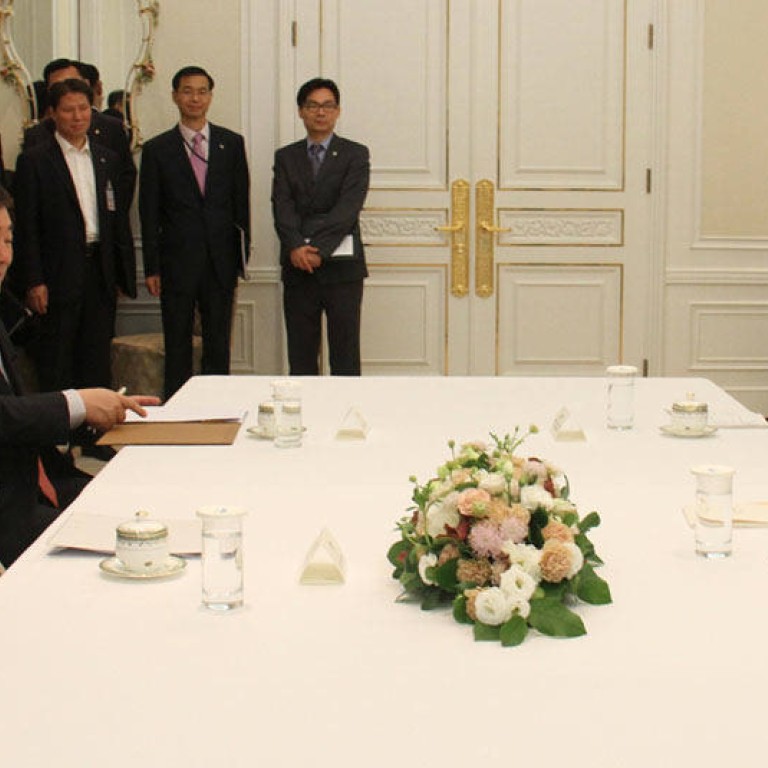
South Korean president puts China ahead of Japan in visiting Beijing
North Korea's nuclear programme and trade relations will be high on the agenda during a three-day state visit that signals Seoul's new priorities
Pyongyang's nuclear programme is set to top the agenda when South Korean President Park Geun-hye arrives in Beijing tomorrow for a three-day summit with President Xi Jinping.
The state visit is Park's second since she came to power in February. The first was to the United States last month. In the past, South Korean leaders have traditionally visited Tokyo before Beijing.
Park told senior South Korean officials that her priorities during the visit would include peacekeeping initiatives with North Korea, the success of which she said "largely depends on how much co-operation she can get from China", reported.
Analysts say the timing is perfect for Seoul to get Beijing to exert more pressure on North Korea.
"When Xi met Obama recently, the leaders prided themselves on being on the same page regarding North Korea's nuclear situation, and when Park met Obama recently, the outcome was the same," said Jaewoo Choo, from the department of Chinese studies at Kyung Hee University in Seoul. "It is only logical that Beijing and Seoul will find common ground now too."
China has grown increasingly impatient towards its long-term ally North Korea since Pyongyang conducted an underground nuclear test in February. Beijing has moved to enforce the UN's latest sanctions against the North and restricted Pyongyang's financial operations in China, which were widely blamed for funding its nuclear programme.
During a visit to Beijing last week, UN secretary-general Ban Ki-moon praised Xi for China's role in defusing tensions on the peninsula.
"China has been tough enough towards North Korea, but it would still like to give them a chance," Choo said.
Another topic high on Park's agenda is trade. For South Korea, whose largest trading partner is China, the prospects of closer relations with Beijing are laced with financial incentives. China and South Korea have been in formal free-trade negotiations since last year and it is hoped that Park's visit might spark a breakthrough ahead of the sixth round of talks in Busan next week.
Accompanied by a large business delegation featuring representatives from Samsung and Hyundai Motors, Park will visit Xian where Samsung is building a US$7 billion complex. South Korea is one of only a few economies that enjoys a trade surplus with China. Bilateral trade exceeded US$53 billion in the last year.
Dr William Choong, an analyst at the International Institute of Strategic Studies in Singapore, said Beijing was being "very straightforward and clever" in the way it was trying to balance American influence in Asia.
"It's using the carrot of investment opportunities in China to entice US defence allies into its orbit; to buy enough goodwill and diplomatic capital for return favours in the future," he said.
Despite warming ties with Seoul, Choong does not see any major shift in Beijing's policy towards Pyongyang, even as it seems to take its commitment to UN sanctions more seriously. "China follows the Goldilocks formula," he said. "It will push, but not too hard. It will not push North Korea over the edge; China can't afford a collapse."
Park, who is fluent in Putonghua and reportedly fascinated by Chinese culture, may be the person to achieve a new bilateral rapprochement. The Korean news service Yonhap reported that she would deliver parts of her speeches in Chinese during her visit. The move would almost certainly spark headlines, as well as win Chinese hearts and minds.
"President Park has a soft spot for China," said a recent article by China News Service. "This kind of friendly public diplomacy gives a good impression to Chinese people and is extremely important."
While the summit will be the first between new administrations in both countries, the two leaders are no strangers to each other. Park has met Xi twice before, when he was Communist Party secretary of Zhejiang in 2005 and 2006.
Now the stakes are higher. Professor Jin Canrong , from the school of international studies at Renmin University, said Seoul could serve as a bridge between Beijing and Washington.
"South Korea needs to befriend both superpowers; the most appropriate role to take in the future would be as a bridge between China and the United States," he said, adding that Seoul was already doing that to some extent. "The strategists in Seoul are very clever - with Washington they stress the common value of democracy and with Beijing, they talk about the cultural value instead, which is Confucianism."
It remains to be seen how Park will handle her position in a complex diplomatic triangle that spans the Pacific.
Professor Kang Myung-koo, at Seoul National University, said he was optimistic that Park's strategy would be to lean closer to Beijing than did her pro-US predecessor, Lee Myung-bak.
"South Korea can't be the balancer; it's rather the opposite," Kang said. "Traditionally Japan was seen as our second most important partner, but without the Chinese market the South Korean economy can't survive. We need to be realistic."
